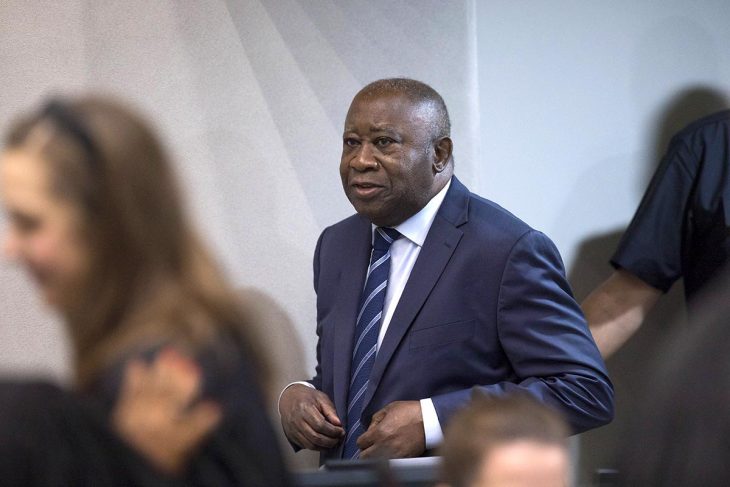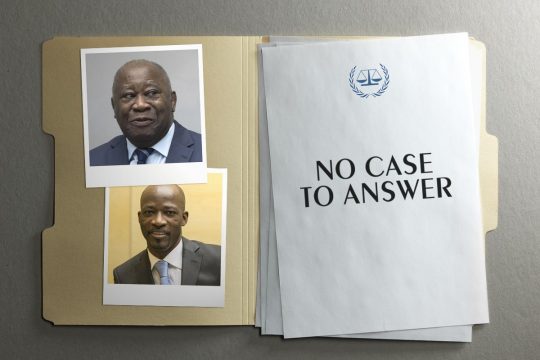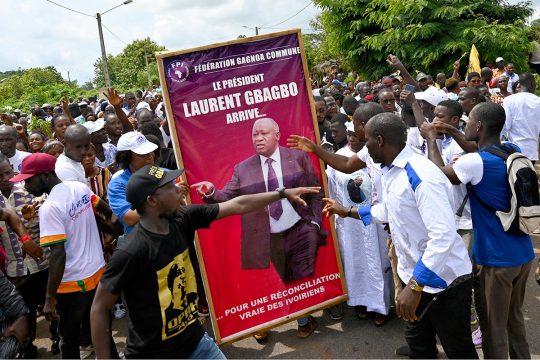In Abidjan, supporters of former president Laurent Gbagbo expressed their joy on social networks and in meetings, particularly in Yopougon. This large suburb, considered a Gbagbo stronghold and which recently elected his son Michel to parliament, was the scene of celebration. Groups of people formed spontaneously to follow broadcast of the decision and let their joy explode afterwards.
This decision is final. Gbagbo and his last defence minister Charles Blé Goudé will no longer face prosecutor Fatou Bensouda in the dock at the International Criminal Court (ICC). Judges of the ICC Appeals Chamber acquitted the two Ivorian personalities, confirming a decision of the lower court in January 2019.
Local MPs like Dia Houphouët did not hesitate to take part in these celebrations, which were less significant than those of January 2019. "People are happy to know that this case is finally over. We knew they weren't going to say anything else. In any case, they could not go back to prison," said Franck Djédjé, a student close to Gbagbo whom we met in Yopougon.
300 Gbagbo supporters still in jail
With the exception of Yopougon, Côte d'Ivoire’s economic capital greeted the decision with calm. Ivorians, no doubt exhausted by a long, frequently interrupted trial, have become somewhat disconnected from the ICC. But memories of the 2010-2011 electoral crisis remain, with several people in prison for cases related to this episode, which resulted in more than 3,000 deaths and was the most violent in Côte d'Ivoire’s history to date.
Désirée Douati, daughter of Gbagbo’s former minister Alphonse Douati, is president of the Association of Women and Families of Prisoners of Conscience in Côte d'Ivoire (AFFDO-CI). Reached by phone a few minutes after the judges' decision, she was thinking of people close to Gbagbo still in jail. “We are happy," she said. "We are proud to have held out despite the great oppression that has reigned in the country. I take this opportunity to ask that all civilian and military detainees still in custody in Côte d'Ivoire be released." She went on to say she does not think reconciliation is working well. “As long as there is an Ivorian in prison for his or her opinions, our record will be negative. Today, we have more than 300 people unjustly incarcerated, including about 30 who have been detained for ten years. We demand that all these people be released!"
She thinks "no Gbagbo supporter or person close to the president has a place in prison" because "at no time in ten years has anyone close to Ouattara [the current president] been arrested, charged, or placed under a detention order, even a provisional one, for acts he or she may have committed". “Côte d'Ivoire must follow the path of reconciliation through forgiveness, not through a less than impartial justice system," added the president of AFFDO-CI. She concluded with a tribute to Aboudrahamane Sangaré, a political companion of Gbagbo, who died in 2018 and who had predicted his release.
"This decision enshrines impunity in Côte d'Ivoire
The ICC appeals decision has sparked reactions among victims. Issiaka Diaby, president of the Collective of Victims of Côte d'Ivoire (CVCI), was at the Plateau courthouse in Abidjan's administrative district when he heard that Gbagbo and Blé Goudé had been acquitted. He had been going there regularly for the past few days to participate in the trial of Amadé Ouérémi, a former militiaman accused of participating in mass killings in the western town of Duékoué during the 2010-2011 crisis.
"After this decision, some victims feel that they have been the victims of a judicial farce, that the prosecutor's office and the ICC were in cahoots to violate their fundamental rights. This decision enshrines impunity in Côte d'Ivoire," said Issiaka Diaby, who believes that this outcome is "a serious matter for this institution of international justice that has worked for eight years”. "Three thousand dead and no one is guilty!" he lamented. "We will meet with the victims within 48 hours to soothe their hearts and ease their suffering."
“My husband is not coming back”
Located between the Plateau, Abidjan's administrative district, and Yopougon, the commune of Attécoubé has many victims of the crisis. Among them is Cathérine K, whose husband lost his life during the post-election crisis. This mother of two who received compensation from the Ivorian government in 2018 was not interested in the verdict pronounced more than 7,000 kilometres away from her modest neighbourhood.
"My son, I have moved on," she said. “I don't have any particular reaction. If they are free, thank God. It's good for them and their children. My husband is not coming back. Now my children are growing up and they don't have a job. The month is over and I still haven't found the money for the rent. What do I care about Gbagbo's case?”
Now 55 and struggling to make ends meet, she says that she no longer expects anything from politicians or international bodies. "They gave us money and then it was over. No one has come back. Are the presidents thinking about me? Does the ICC think about me? Why should I think about them? My husband is dead. All I want is for my children to work so that they can bury me one day," she says, her voice hoarse with emotion.
"Those who are celebrating or those who are angry have lost nothing in the crisis," says this victim, who calls for lasting peace in Côte d'Ivoire.








